Negotiating Value in Contractual Relationships: Part 1

- Part 1: We’re Not Aligned on Value
- Part 2: “Negotiation” Could Be So Much More
- Part 3: Value Management – “Negotiation” In Action
Our friends at WorldCC regularly produce a report on the most negotiated contract terms, comparing and contrasting them with the contract terms considered most important.
The latest edition of this report got us thinking about “negotiation” and how Value Management supports and enables it in its widest sense.
In this first part, we look at how we’re not aligned on what matters – what is valuable – and how this all starts to go wrong at the negotiation stage.
Value is why we do anything: it’s the goal of our relationships, it’s what our contracts should support, and it’s what the negotiations for those contracts should focus on.
But, even more than that, focussing on Value – Value in its widest sense; not just financial value (crucial though that is) – is the only effective way of navigating the Complexity of today’s world.
It reflects and “tracks” the accelerating change we’re all experiencing, it creates focus and purpose – attracting and motivating people – and it’s the ultimate guide or “north star” for formulating strategy, making decisions and deploying scarce resources.
But “value” is a much-misunderstood term: because it is primarily used as a noun, it locks it into our thinking as a “thing”, which greatly limits our conception of what it is and how it “works”.
Value = Things That Matter
To tap into Value in its widest sense, we often talk about it in terms of the Things That Matter that make up that Value – the elements of Value – and these encompass Value from every possible perspective:
- Value towards-the-positive: outcomes to pursue; values to aspire to.
- Value away-from-the negative: issues to deal with; risks to avoid.
- Value in the “middle” or “neutral”: often external requirements.
The “discipline” of considering what “makes up” Value for us in terms of Things That Matter taps into the intuitive sense we have about what is valuable, whilst also helping us to capture that Value in a recognizable way that we can communicate.
And when we do that, we find that many, if not most, of the Things That Matter are significantly or wholly subjective.
Think about what matters to you at any one time, and you’ll soon realize that that’s true – it’s more often than not intangibles like feelings, perceptions, your held values and experiences – and as we’ll see in a bit, that’s really important when we think about our contracts and what we’re negotiating with them.
But the Things That Matter pose several challenges.
The Challenges
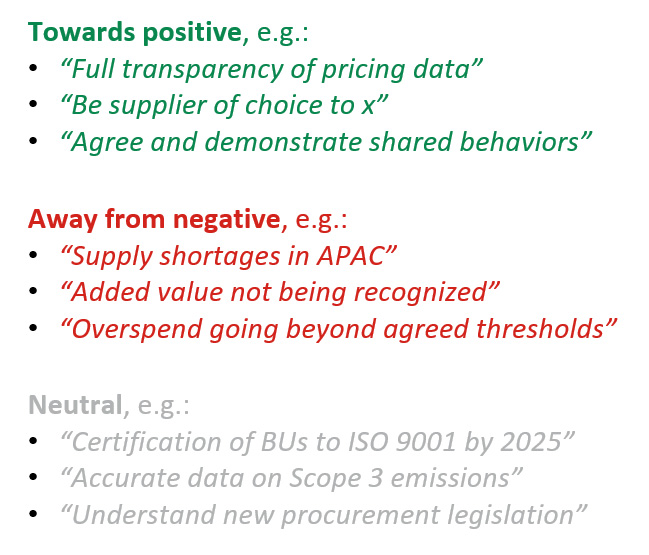
From some examples to the right, you’ll see that Things That Matter are between abstract and actionable: they’re recognizably about something – so not entirely abstract – but then not clearly or immediately actionable.
Actions need to be taken, but what those are may not be clear.
They’re also typically cross boundary, often going across lifecycle stages, and whilst that gives them greater “currency” and ought to foster consistency, it usually means that they fall between the cracks when it comes to ownership and responsibility.
And many Things That Matter – especially the increasingly important subjective ones – don’t have a natural home, including and especially in contracts and in what we tend to measure in our relationships.
So, as a result, not only are they hard to progress, but we find time and again that people aren’t clear and aligned about what matters:
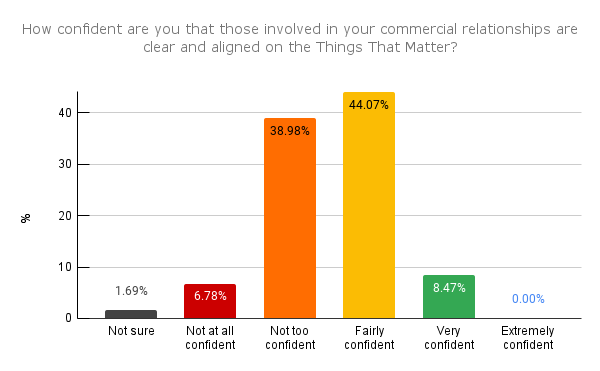
Not even 10% are “very confident” that those involved in their commercial relationships are clear and aligned on the Things That Matter, and the majority of the rest are either “not too confident, or “not at all confident”.
The scope for misassumption, misunderstanding, misalignment and missed opportunities is obvious.
And, as WorldCC‘s reports make clear in specific detail, this all begins with “negotiation”.
It Begins With Negotiation
One of the most powerful parts of the Most Negotiated Terms report is this comparison table, and you’ll immediately see the contrast between what is being most Negotiated with contracts and what is considered most Important:

If we grey-out the overlap between the lists, this mismatch becomes even clearer:
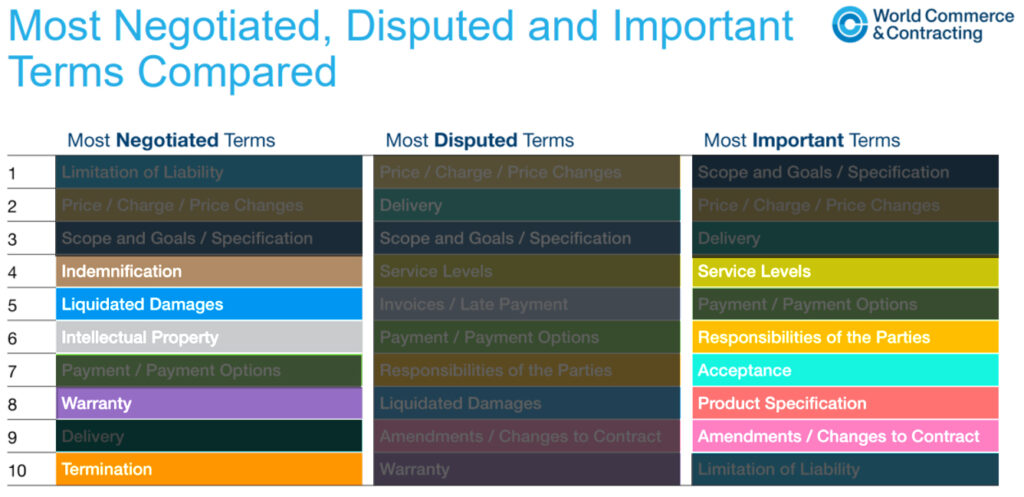
Only half of the terms are in both lists, so negotiations are missing out half of the most important terms, and that also means that half of what’s most negotiated isn’t what is considered most important.
But it gets worse, because negotiations are at best only partly effective in heading off disputes. Bearing in mind what we saw above about the state of confusion and misalignment at the front line, now let’s light-up the overlap between negotiated and disputed terms…:
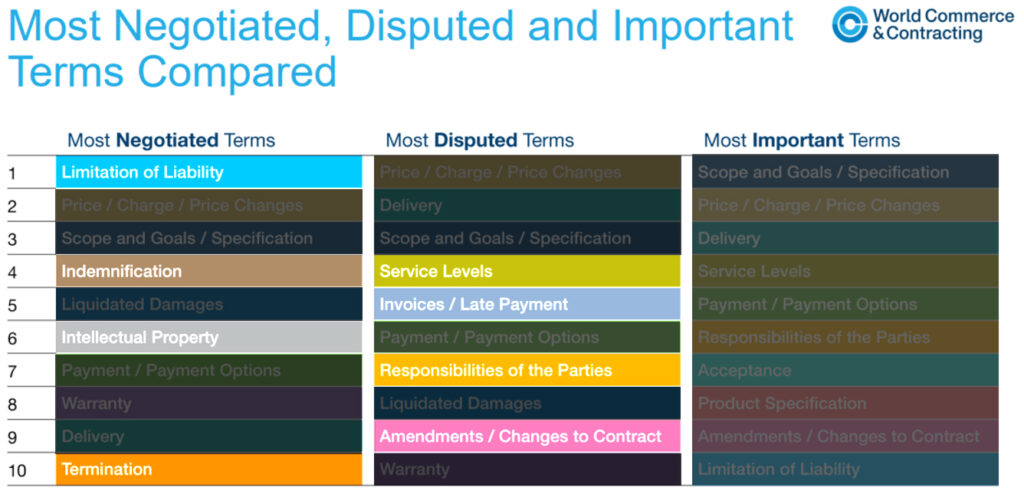
…and over half of what’s most negotiated is still in the top ten most disputed terms.
So negotiations aren’t consistently focusing on what people say is most important, and around half of the time, what negotiations do focus on still ends up being the subject of disputes.
But what’s at least as striking about this table, is what it doesn’t show.
So, if we now flip over to another recent WorldCC report – on the Purpose of Contracts – the number one purpose is rights and responsibilities, with providing a framework for successful outcomes and supporting a business relationship also right up there:

However, back on the most negotiated terms, there’s no sign of responsibilities or anything about the relationship itself:

And outcomes – whilst in third place – are tied to specification, so largely hard outcomes.
Looking at the most important terms, responsibilities is there, but, again, there’s the limited sense of outcomes, and nothing directly about the relationship.
And note that if you ask people what’s most important in a relationship, of any kind, they nearly always say that it’s communication, of which there’s no sign anywhere.

So is it any wonder that only 39% believe that contracts support outcomes, and only 16% that negotiations focus on the right things?
The State of Play
Put all this together and the state of commercial relationships is shocking:
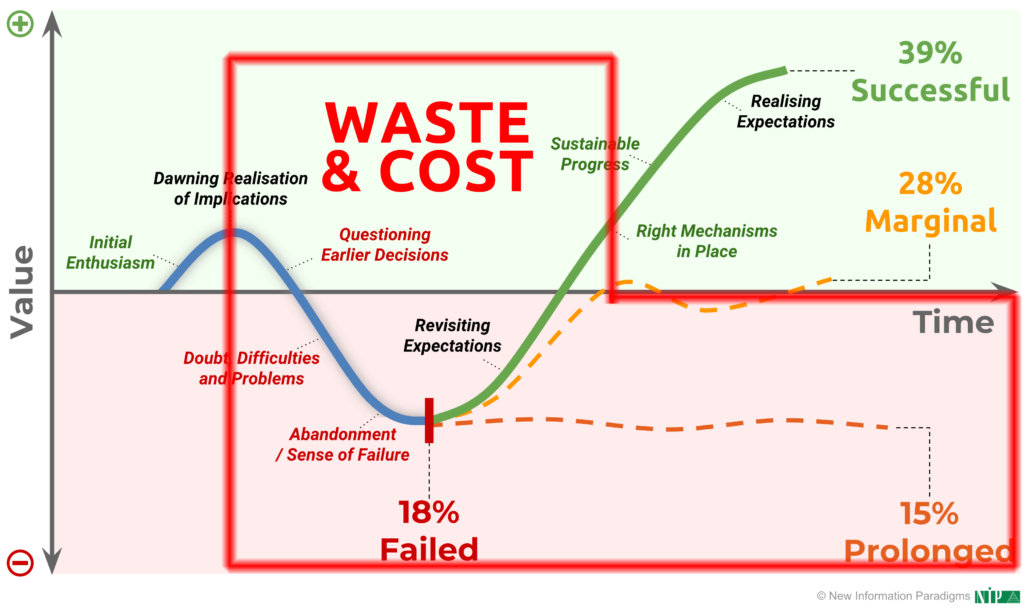
And this all reflects that negotiations lack focus and clarity around outcomes, don’t give enough attention to the relationships themselves, and create huge risks by leaving huge gaps in the resulting contracts.
Only just over a third of relationships are successful in meeting expectations, and the waste and cost here – not just financial, but in human terms, too – are extraordinary.
Something needs to change…!
Next time, we’ll start to see what that looks like.

